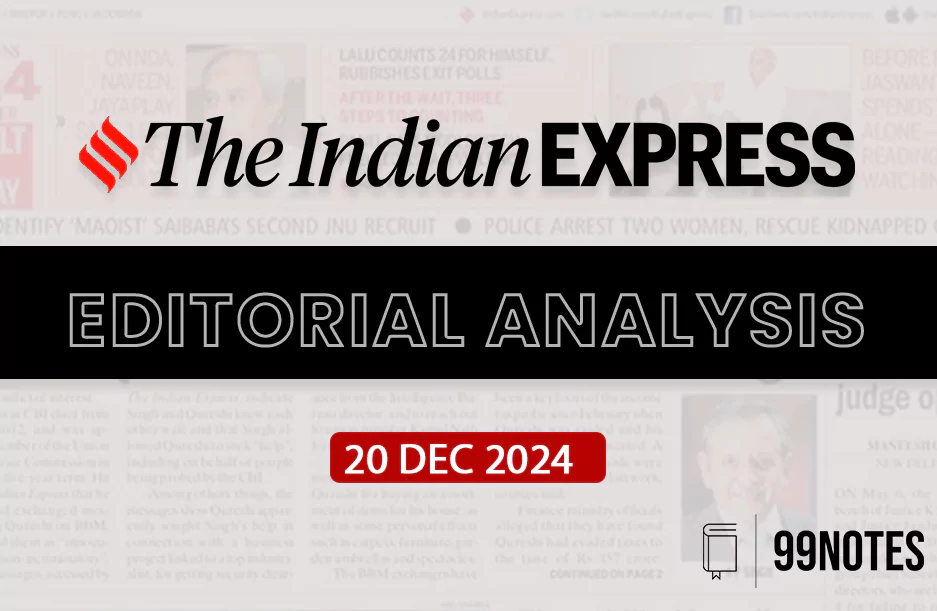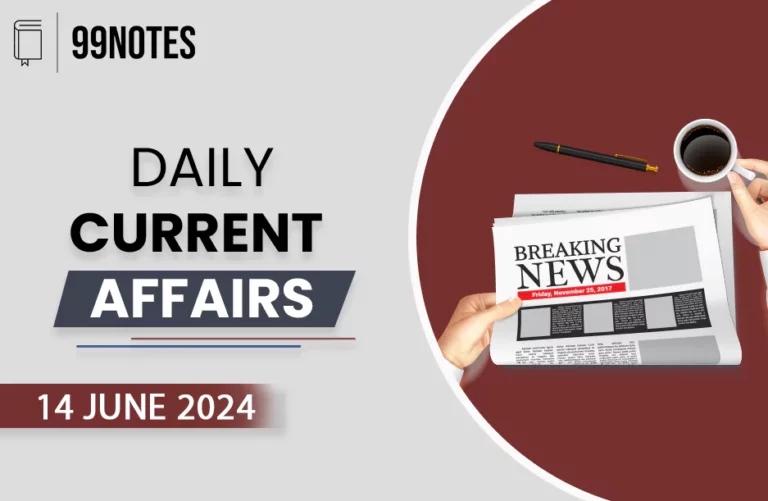20 December 2024 : Indian Express Editorial Analysis
1. The bridge to Moscow
(Source: Indian Express; Section: The Editorial Page; Page: 10)
| Topic: GS2 – International Relations |
| Context |
|
Great Power Dynamics in 2025
- The foreign policy landscape of 2025 is set to be dominated by the evolving relationships among global powers.
- The U.S., under a potential new administration, might recalibrate its ties with European allies and intensify competition with China.
- Meanwhile, India is emerging as a stabilizing force, particularly in its efforts to manage relations with China and strengthen the Indo-U.S. partnership.
- However, the most significant bilateral relationship in 2025 will be between India and Russia.
- This partnership, deeply rooted in trade, technological collaboration, and strategic interests, has implications for global stability.
India-Russia Ties: A Strategic Necessity
- India and Russia share a robust partnership built on mutual dependence in critical areas such as energy trade and high-tech cooperation.
- Russia remains India’s most reliable supplier of advanced technology, filling gaps that Western nations, despite relaxed trade norms, are yet to address fully.
- For instance, while the U.S. and France are opening up to dual-use technologies, India’s long-range and undersea capabilities continue to rely heavily on Russian support.
- This dependence highlights the indispensable role Moscow plays in India’s strategic planning.
A Bridge to the West: Implications Beyond Bilateralism
- The India-Russia relationship is significant not only for the two nations but also for the West.
- Collaborative projects like the BrahMos missile, co-developed by India and Russia and sold to the Philippines, illustrate how this partnership supports the rules-based order.
- Such initiatives allow Russian technology to counter Chinese influence without provoking direct conflict.
- Moreover, India’s diplomatic positioning enables it to act as a bridge between Russia and an increasingly alienated Western bloc, ensuring that Moscow remains tethered to a multilateral system.
Preventing a Sino-Russian Monolith
- India’s partnership with Russia helps counterbalance China’s growing influence over Moscow.
- By offering a relationship of equals, India provides Russia with an alternative to becoming overly dependent on Beijing.
- This dynamic is crucial for global stability, as a Russia entirely subservient to China’s interests would disrupt the balance of power, particularly in Europe and Asia.
- India’s engagement ensures Russia retains its sovereignty in international relations, preserving its role as an independent global actor.
Stabilizing Energy Markets
- The energy trade between India and Russia has broader implications for global markets.
- Designed to comply with sanctions, this trade provides stability and predictability to energy prices.
- For Europe, which remains vulnerable to disruptions, this arrangement is a critical factor in avoiding further political and economic instability.
- India’s role as a mediator in the energy sector underscores its importance in maintaining global market equilibrium.
Arctic and Connectivity Opportunities
- The Indo-Russian partnership opens new avenues in the Arctic, a region of growing strategic importance.
- India’s involvement, in collaboration with Russia and other nations, counters the potential dominance of a Russia-China alliance.
- Initiatives like the proposed Chennai-Vladivostok corridor reflect India’s commitment to fostering inclusive and sustainable governance in the Arctic.
- Such efforts are vital for securing global supply chains and mitigating ecological risks in this fragile region.
Moderating Multilateral Forums
- India’s leadership in multilateral organizations such as BRICS and the Shanghai Cooperation Organisation (SCO) prevents these groupings from becoming antagonistic towards the West.
- By championing moderate and inclusive policies, India ensures these forums complement rather than challenge existing Western-led institutions.
- The inclusion of nations like the UAE, Egypt, and Vietnam, driven by India’s diplomacy, further underscores this balanced approach.
Conclusion: A Global Public Good
- India’s ability to engage with deeply divided geopolitical actors has long been a hallmark of its diplomacy.
- In 2025, the India-Russia relationship will prove critical in stabilizing a fragmented global order.
- While skepticism persists in some Western circles, the partnership’s importance in maintaining energy stability, preventing Sino-Russian hegemony, and fostering inclusive multilateralism cannot be overstated.
- This evolving dynamic between New Delhi and Moscow serves not just the interests of the two nations but also the broader global community.
| What are the Challenges in the relation? |
|
| PYQ: What is the significance of Indo-US defence deals over Indo-Russian defence deals? Discuss with reference to stability in the Indo-Pacific region.
(250 words/15m) (UPSC CSE (M) GS-2 2020) |
| Practice Question: Discuss the evolving India-Russia relationship in the context of global power shifts in 2025. How does this partnership influence international stability and multilateralism? (250 words/15 m) |




